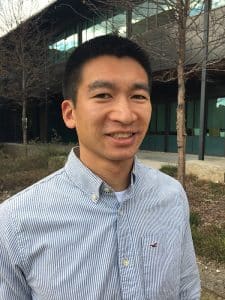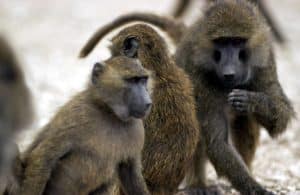
As the new Assistant Director for Research Support at the Southwest National Primate Research Center (SNPRC), Christopher Chen, Ph.D., is in charge of improving operations at one of only seven National Primate Research Centers in the country.
More than 2400 baboons, rhesus macaques, marmosets, and retired chimpanzees are housed at the SNPRC on the campus of Texas Biomedical Research Institute. These animals are a precious resource used not only by scientists at Texas Biomed, but by many scientific collaborators around the country and around the world.
“We want to impact the future of medicine by selectively advancing vaccines and therapeutics with the highest probability of succeeding in clinical trials,” Chen said. “Nonhuman primates are often the best model for approximating the human response. If preclinical trials are successful in these animals, then those new biomedical advances are more likely to work in humans, get approved by the FDA, and be made available to the public.”

The SNPRC is unique among primate centers in that it is housed on the campus of a private, nonprofit institution and not a university. Chen explained this gives the center more autonomy and allows research to progress with fewer unnecessary delays.
“With only seven National Primate Research Centers, there are limited places to perform late-stage development before moving into human clinical trials,” Chen commented. “Our goal is to provide this resource to more scientists.”
Chen joined Texas Biomed in 2016 and was promoted to Assistant Director for Research Support following a nationwide search. He moved to San Antonio from The Mayo Clinic where he was a Research Scientist. “I am confident that Chris’ energy and enterprise will help us develop the operations of the SNPRC to very high standards,” said Deepak Kaushal, Ph.D., Professor and Director of the SNPRC.
Chen will continue to manage an independent research lab. His main focus is developing new animal models for liver disease, a health risk on the rise in the United States.